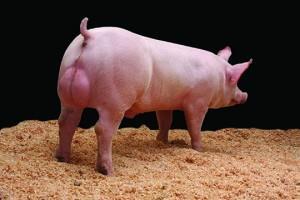The pig production arm of the JSR Farming Group, a 4,000 sow operation producing 2,000 pigs per week, has increased the dead weight of its slaughter pigs and cut its overall cost of production by 2.5% by switching to two new sire lines developed by JSR Genetics.
Against a backdrop of rapidly rising feed prices (up by 40% in the last three years) James Christian, chief operating officer at JSR and his team were looking very closely at the performance of their four breeding sites and twelve finishing units. The search was on to find new ways to maximise output and minimise cost.

Faster growing pigs, which can be taken to heavier weights within their production time frame, could provide the answer. Of course it would need to do that efficiently, with no negative impact on feed conversion ratios. And the resulting quality, measured against a comprehensive set of metrics including back fat ratios, would have to be equal or better than that which was currently being achieved. Last but not least, the new pigs would need to be sufficiently robust to thrive in any one of JSR’s production units, which are located in areas of varying disease challenge.
James Christian takes up the story…
“We discussed our ideas with JSR Genetics and challenged them to develop new sire lines for our business which could produce rapidly growing, high quality, robust pigs without compromising feed efficiency, quality or resilience. It was quite a challenge, but they didn’t let us down. Trials of the resulting new lines, the Geneconverter 800m and 400, produced such immediate, positive results that the decision to switch all of our production over to the new lines was easy.”
Twelve months ago, JSR identified the importance of increasing the slaughter weights of their pigs and during the last year have increased the carcass weight by 3kg. JSR now has contracts in place which will allow them to work towards a target slaughter weight in excess of 83kg. The pigs are also delivering good carcass yields whilst maintaining low back fat levels of an average of 10.2mm. This suggests of course that heavier weights can be achieved with these sire lines without compromising quality. The new pigs are also proving to be robust and easy to manage.
In terms of their growth they are, on average, gaining an additional 122g per day from 30kg to slaughter. However they are also making exceptional progress in the critical, early stages of their development, increasing JSR’s average weaning weight by an average of 0.75kg. This, together with enhanced natural resistance to a range of widespread diseases including scour, is helping the business to achieve impressive low mortality and high average weaning rates. These are currently running at over 11.5 per litter, right across the business.
James Christian believes that these results speak for themselves: “We have made good progress in our efforts to take our pigs to heavier weights, without compromising quality or efficiency and we’ve reduced our overall cost of production by 2.5%. This is great news for our business and we will continue to increase slaughter weights up to 90kg.”
JSR Genetics director of Science and Technology, Dr Grant Walling, is also impressed with the results that the new sire lines are delivering: “We’re always working to improve the genetics we offer to our customers and, as one of our largest clients, the production arm of our own business can be guaranteed to continue challenging us and helping us to deliver sire lines that the industry is looking for. As we continue to work with our international partners and invest heavily in research and development, we believe that we have more, very exciting breakthroughs on the way.”
This story was originally published on a previous version of the Meat Management website and so there may be some missing images and formatting issues.












